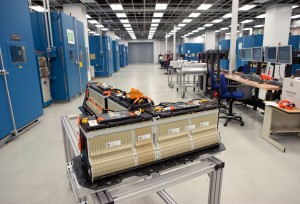You hear both sides of the battery cost question a lot when you cover electric cars.
One side says, "Electric-car batteries will be brutally expensive for many years to come, so electric cars will never be practical."
The other side believes, "With wonderful new discoveries coming out of labs and the pace of progress in electronics, batteries will soon cost just a fraction of what they do today, making electric cars cost no more than combustion cars--or even less."
No Moore's Law
There are elements of truth to both, but it's all about the rate of change.
It's often said, "There's no Moore's Law for electric cars"--meaning that lithium-ion battery cells do not double in performance every 18 months, as processor speeds have done.
Instead, the best proxy is to look to the consumer lithium-ion cell maket, now more than 20 years old.

Lithium-ion battery pack for 2011 Chevrolet Volt
The small commodity cells in your mobile phone and portable computers are now just a fraction of the cost of the first lithium-ion cells that Sony launched in a 1989 video camera.
Averaged over that time, the rate of performance increase has averaged 6 to 8 percent a year.
Consumer cells show the way
It hasn't been linear, with improvements in both cell chemistry and process technology leading to notable declines once volume production is achieved, followed by a cost plateau.
But we've talked to half a dozen cell makers over the last 18 months, and all of them accepted a 6-to-8-percent annual performance improvement as appropriate for the large-scale automotive cells used by every plug-in carmaker except Tesla Motors.
A 2010 National Academy of Sciences report estimated pack costs then at $625 to $850 per kilowatt-hour.
So where does that take us? If we assume that the 2011 Chevrolet Volt's 16-kWh pack cost roughly $750 per kilowatt-hour (or about $12,000), then we can project the two rates of decline.
At 6 percent a year, the same pack in 2020 would cost just $430/kWh, or $6,500 in total. At 8 percent, it would be even cheaper, at $354/kWh or $5,200 altogether.
2020: $200 to $500 per kWh?
Those numbers tie neatly to estimates by clean-tech market intelligence firm Pike Research--contained in Electric Vehicle Batteries, a very pricey report--that the installed cost of lithium-ion batteries will fall by more than one-third by the end of 2017.

Estimates of electric-vehicle battery costs (first published in Tech Review, Jan 2012 issue)
Pike also projects that the market for such batteries will grow from $2.0 billion last year to almost $15 billion by 2017.
Even better, the technology magazine Tech Review (registration required) analyzed Li-ion cell cost projections through 2020 from a variety of sources, including financial institutions, industry analysts, and electrification groups.
Their projections for costs in 2020 ranged from a low of $225 per kWh to $500/kWh from the most pessimistic sources--but both high and low estimates declined roughly 7 percent a year.
Real costs? No one will say
The actual cost of lithium-ion battery packs is one of the most closely guarded secrets in the electric-car world. We've not found a single maker willing to go on record and say what their cost per kilowatt-hour is.
That's why a statement by Tesla Motors CEO Elon Musk that cell cost would go below $200 per kilowatt-hour "in the not-too-distant future" made such news last month. In general, the pack adds another 15 to 20 percent on top of the cost of the cells themselves.
Awaiting the hockey stick
Most industry analysts believe that the "hockey stick" demand curve for electric cars--when the rate of increase in demand starts to accelerate--will come in the later years of the decade
Nissan CEO Carlos Ghosn says that for his company, it will be in 2016, when the Nissan-Renault Alliance can make up to 1 million battery electric vehicles a year. For the rest of the industry, it's likely to be closer to 2018 to 2020.
Meanwhile, if you hear someone say that electric cars will plummet in cost just next year, raise your eyebrows.
And do the same if you hear elsewhere that plug-in cars will never be practical, because batteries will cost "tens of thousands of dollars" for the next 20 years.
Take the long view. Change is coming, and it will most likely be at a rate of about 7 percent a year.
+++++++++++













